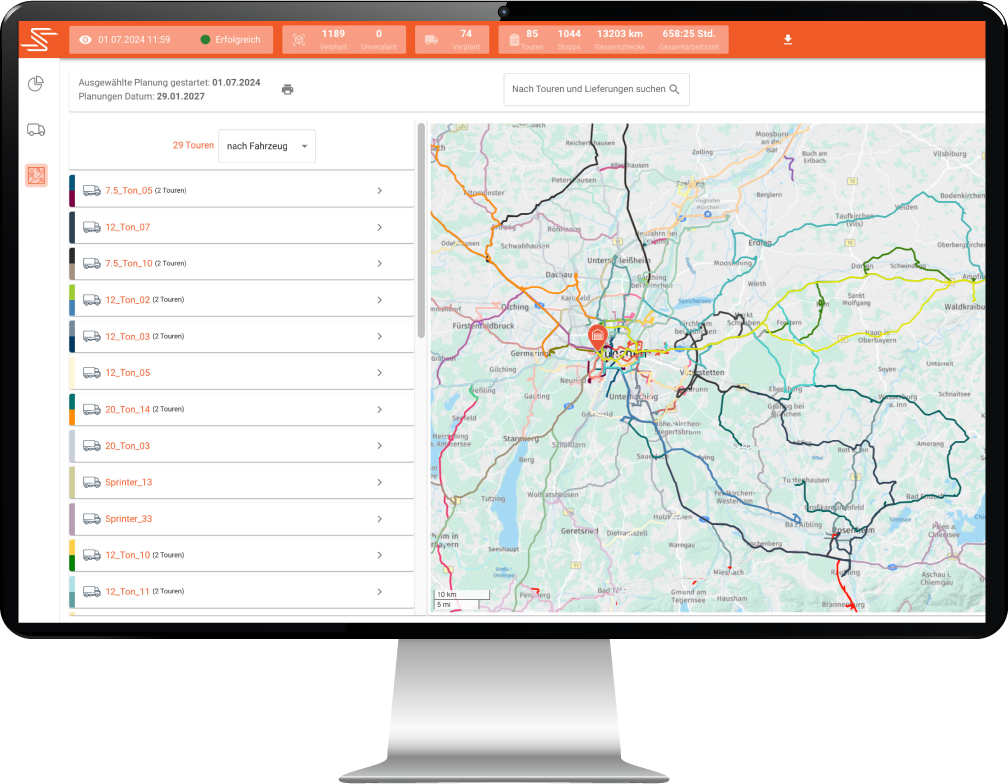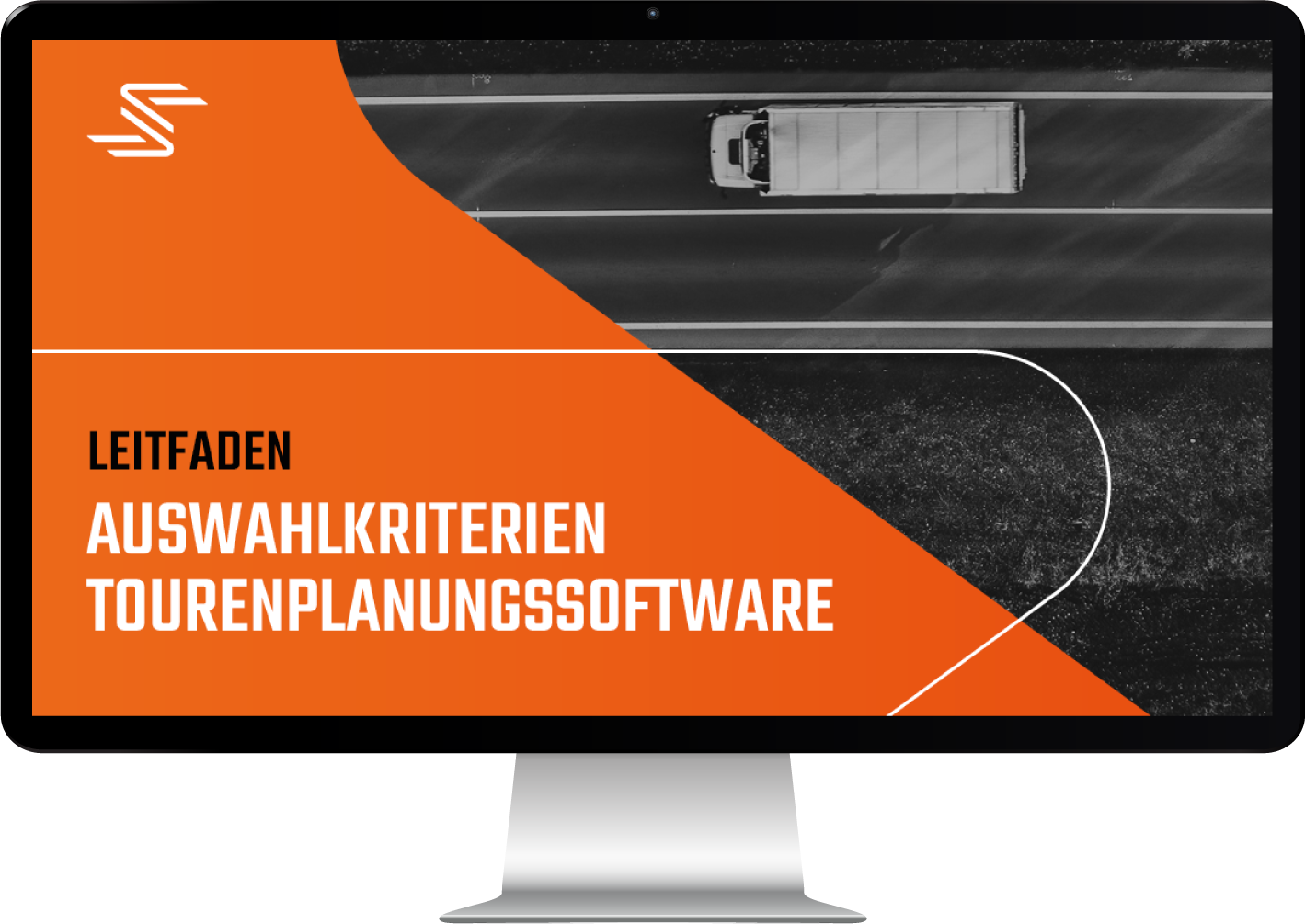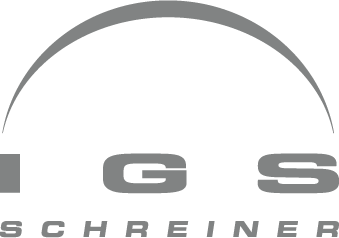
Mastering general cargo Logistics:
Efficiency Through Intelligent Route Planning
General cargo logistics is complex: numerous shipments, diverse goods, strict delivery times, and rising costs put companies under pressure. Adding to the challenge, the labor shortage is becoming increasingly noticeable. To remain competitive in the long term, efficient scheduling is essential.
The solution? An intelligent route planning software tailored to the logistical challenges of general cargo distribution. It ensures maximum efficiency and provides seamless access to optimized route plans. Companies leveraging smart route planning gain a clear advantage: they optimize capacity utilization, reduce empty runs, and maintain control even in the face of unexpected disruptions.
the challenges of general cargo logistics
General Cargo logistics presents unique challenges for companies, as numerous heterogeneous shipments with varying destinations, delivery times, and specific transport requirements must be efficiently coordinated. A robust route planning software tailored to the LTL sector should be capable of overcoming these challenges:
complexity
Numerous heterogeneous shipments with diverse destinations and requirements create a highly complex transport planning process. The challenge lies in coordinating all these shipments in a timely and cost-efficient manner.
Data Quality
In LTL logistics, dispatch often struggles with delayed, inaccurate, or completely missing shipment information. This places high demands on the quality of available master data.
IT-infrastructure
The multitude of specific planning information generates a massive amount of data that must be processed. Additionally, new route planning software needs to integrate seamlessly and efficiently as an add-on to the TMS (Transportation Management System).
Dependencies
Planned and unplanned staff absences are part of the daily reality in dispatching. The availability of efficient route planning often depends on individual knowledge, making the planning process error-prone and difficult to scale.
Labor Shortage
Skilled drivers and dispatchers are in short supply. Existing resources are often underutilized, and repetitive manual processes consume valuable capacity. Moreover, night shifts and high stress levels make the dispatcher role less attractive.
Flexibility
LTL logistics frequently faces changing market conditions and unpredictable events. Manual processes and incomplete data foundations hinder quick responses, while a lack of adaptability and scalability undermines long-term competitiveness.
Why You Should Rely on Route Planning Software
To remain competitive in the long term and sustain growth, processes must be streamlined, and available resources optimally utilized. This can be achieved by digitizing knowledge and automating repetitive, complex planning processes. To ensure maximum efficiency, the software solution should not be generic but rather tailored to address the specific requirements and challenges of LTL logistics. With our solution, Smartlane Transport Intelligence, we empower you to automate dispatch processes, optimize your transport planning, and maintain flexibility in responding to changes:

- Expert Solution for General Cargo Logistics
- Easily Integrates as an Add-On to Your TMS
- Optimized and Realistic Planning Even for Complex Use Cases
- Continuous Improvement of Data Quality for Enhanced Planning Efficiency
- Scalability and Quick Adaptation to Market Changes
- Maximum Transparency and Control
Benefit from Additional Advantages
Implementation without
process adjustments
Comprehensive support
from our experts
Planning reliability even
during staff shortages
Guide with Checklist
Finding the Right Route Planning Software

Are you considering investing in route planning software or already searching for the right solution? In our whitepaper, we reveal what to look for when choosing the right software and provider! You’ll receive a guide for creating a requirements analysis, detailed insights into the most important selection criteria, and a clear checklist to support your decision-making process!
Please note: The whitepaper is currently only available in German.
Success with Our Customers Speaks for Itself
Together with Smartlane, Hartmann Paderborn achieved significant improvements in transport and route planning. By automating dispatching processes, the company reduced planning time by five hours per day in just a short period.
HARTMANN INTERNATIONAL has saved five hours
of dispatching time with Smartlane

„„Dispatching in LTL transport is a highly complex and time-consuming task. Smartlane’s technology supports our dispatchers by automating manual processes and reducing their workload enormously. This has enabled us to improve the quality of our services significantly. Furthermore, our dispatchers no longer have to begin their workday in the middle of the night – they can come in four hours later now.“
Uwe Lachmann
CEO Hartmann International
START YOUR JOURNEY into the Future of general cargo






request a demo
Don’t wait any longer—optimize your groupage logistics with tailored route planning software. Our experts are excited to advise and support you in improving your dispatch processes. Discover in a no-obligation consultation how your company can benefit from Smartlane Transport Intelligence.
Feel free to contact us by phone or via the contact form below, including your current number of shipments per month.
Frequently Asked Questions About general cargo
General Cargo refers to the transport, storage, and distribution of goods that are packaged into manageable individual units, such as boxes, crates, pallets, or barrels. Unlike full truckload shipments, where a truck carries a single large delivery, groupage logistics involves consolidating multiple smaller shipments from different customers to optimize transport routes. This requires careful planning and coordination, as the various shipments may have different destinations, delivery deadlines, and transport requirements.
The biggest challenges in general cargo logistics include high complexity due to multiple shipments, varying transport requirements, tight delivery windows, rising transportation costs, unpredictable disruptions, and the need for optimal vehicle utilization.
Common mistakes in planning general cargo shipments include insufficient consideration of the specific transport requirements of goods, inefficient route planning, lack of flexibility in handling unforeseen disruptions, and poor vehicle utilization.
Route planning software optimizes route planning, reduces transportation costs, ensures on-time deliveries, adapts dynamically to disruptions, and enables better vehicle utilization. This leads to higher efficiency and cost savings in general cargo logistics.
Using route planning software provides companies with benefits such as automating manual processes, optimizing route planning, reducing transportation costs, meeting delivery deadlines, offering flexibility in handling disruptions, and maximizing vehicle utilization. Furthermore, simplified and automated route planning can be performed even by non-experts in the event of staff shortages, ensuring planning reliability even in such cases.
Companies benefit from automation in general cargo logistics through reduced manual input, increased accuracy in planning, faster processing times, and overall more efficient management of logistics processes. Automation can also help minimize errors and improve responsiveness when issues arise.